Psychology |
In Pictures:
|
****Hyperlinked titles will take you to our copy on sale or prebuilt searches of copies on sale****
Useful Links:
Books on Ebay-see our specially prebuilt search below
Books on Amazon-see our specially prebuilt banner below
Titles to Look Out For:
[in alphabetical order of title. Date indicates earliest edition published]
1998. Advances in Sport and Exercise Psychology Measurement
1991. Becoming A Profession: The History of Art Therapy in Britain 1940-82
1986. Group Analytic Psychotherapy: Method and Principles by S. H. Foulkes
1990. Selected Papers: Psychoanalysis and Group Analysis by S. H. Foulkes
1995. Social Psychology at Work edited by Peter Collett and Adrian Furnham |
|
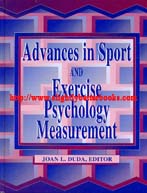
1998, Fitness Information Technology, hbk
In stock, click image to buy for £25.75, not including post and packing
Alternative online retailers to try:
Click here to access our prebuilt search for this title on Abebooks
Or click here to access our prebuilt search for this title on Alibris
Or click here to access our prebuilt search for this title on Ebay
Or try Biblio



|
About this book: This volume provides a comprehensive review of measurement approaches within sport and exercise psychology. Over 50 of the world's leading experts in sport and exercise psychology contribute to 29 chapters on the historical, theoretical, and methodological foundations of existent measures. Comprehensive validity and reliability information as well as directions for future measurement research are also highlighted.
Contents:
Part One : Sport Motivation and Perceived Competence:
1. Attributions and Attributional Style by Stuart Biddle and Stephanie Hanrahan
2. Measurement of Goal Perspectives in the Physical Domain by Joan L. Duda and Jean Whitehead
3. Sources of Competence Information by Thelma S. Horn and Anthony J. Amorose
4. The Measurement of Self-Efficacy and Confidence in Sport by Deborah L. Feltz and Melissa A. Chase
5. Measures of Intrinsic and Extrinsic Motivation in Sport and Physical Activity: A Review and Critique by Robert J. Vallerand and Michelle S. Fortier
Part Two: Sport Anxiety and Responses to Stress:
6. Measurement of Trait Anxiety in Sport by Ronald E. Smith, Frank L. Smoll and Shelly A. Wiechman
7. Measuring Competitive State Anxiety by Damon Burton
8. Measurement of Coping Strategies in Sport by Peter R. E. Crocker, Kent C. Kowalski, and Thomas R. Graham
Part Three: Imagery, Attention and Psychological Skills:
9.
Measuring Imagery Abilities and Imagery Use by Craig R. Hall
10. Issues in the Measurement of Attention by Bruce Abernethy, Jeffery J. Summers and Stephen Ford
11. In Search of Psychological Skills by Shane Murphy and Vance Tammen
Part Four : Group Dynamics in Sport and Exercise
12. The Measurement of Cohesiveness in Sport Groups by Albert V. Carron, Lawrence R. Brawley and W. Neil Widmeyer
13. Measurement of Leadership in Sport by Packianathan Chelladurai and Harold A. Reimer
Part Five: Aggression and Morality in Sport
14. Moral Assessment in Sport Psychology by Brenda J. L. Bredemeier and David L. L. Shields
15. Aggression by Dawn E. Stephens
Part Six: Self Concept and Body Image
16. Advances in the Measurement of the Physical Self by Kenneth R. Fox
17. Body Image and Exercise by Susan Bane and Edward McAuley
Part Seven: Exercise-Related Cognitions, Affect and Motivation
18. Measurement of Exercise-Induced Changes in Feeling States, Affect, Mood and Emotions by Lise Gauvin and John C. Spence
19. Problems in assessing perceived barriers to exercise: confusing obstacles with attributions and excuses by Lawrence R. Brawley, Kathleen A. Martin, and Nancy C. Gyurcsik
20. Perceived Exertion: The Measurement by Bruce J. Noble and John M. Noble
21. Measurement of Incentives to Exercise by Penny McCullagh and John M. Noble
22. Measuring Exercise-Related Self-Efficacy by Edward McAuley and Shannon L. Mihalko
Part Eight: Special Considerations and Alternative Approaches
23. Assessing the Stability of Psychological Traits and Measures by Robert W. Schutz
24. Applications of the Rasch Analysis to Sport and Exercise Psychology Measurement by Gershon Tenenbaum and Gerard Fogarty
25. Ethics in Assessment and Testing in Sport and Exercise Psychology by Edward Etzel, Michael T. Yura and Frank Perna
26. Applied Sport Psychology: Measurement Issues by Robin S. Vealey and Megan Garner-Holman
27. Applied Exercise Psychology: Measurement Issues by Jay C. Kimiecik and Bryan Blissmer
28. Developmental Considerations in Sport and Exercise Psychology Measurement by Robert J. Brustad
29. Measurement Issues in Cross-Cultural Research within Sport and Exercise Psychology by Joan L. Duda and Carl T. Hayashi
Author Index; Subject Index
|
Other Books on Sports Psychology
|
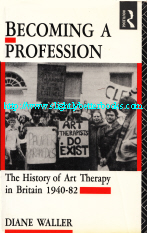
1991, Routledge, pbk
In stock, click to buy for £105, not including post and packing. Very rare, difficult to find volume
Alternative online retailers to try:
Click here to access our prebuilt search for this title on Abebooks
Or click here to access our prebuilt search for this title on Alibris
Or click here to access our prebuilt search for this title on Ebay
Or try Biblio

 
|
- Becoming A Profession: The History of Art Therapy in Britain 1940-82 [top]
Written by Diane Waller
First published on 2nd May 1991 in Great Britain by Routledge in hardback, 320pp, ISBN 0415025818
Published in 1991 in Great Britain by Routledge in paperback, 290pp, ISBN 0415058201 . Cover design: Jonathan Clegg, ADL Design. Front cover illustratin: Part of the marching group of BAAT members at a protest against the Clegg report held with other paramedical professions and the Union ASTMS on 27 March, 1980 . Cover design: Jonathan Clegg, ADL Design. Front cover illustratin: Part of the marching group of BAAT members at a protest against the Clegg report held with other paramedical professions and the Union ASTMS on 27 March, 1980
About this book: Becoming a profession is the first comprehensive historical account of the way in which art therapists achieved recognition and the strategies they employed to establish their training. It covers the period from 1940, when the term was first used in Britain, to 1982, when the Whitley Council granted art therapy its own career and salary structure. Diane Waller draws on a vast amount of previously unpublished material to show how the disciplines of art education, psychiatry and psychoanalysis were influential in giving rise to notions of 'art as healing' and 'art as expression'. She includes interviews with some of the founder art therapists of the 1940s and 1950s, and assesses their contribution in detail. She also describes the work of the British Association of Art Therapists (BAAT), and in particular the campaigns for recognition mounted by BAAT in co-operation with the trade union movement. Fascinating reading for all practising art therapists, art therapy teachers and students, Becoming a Profession will also be relevant to anyone interested in the formation and development of professions
Chapters:
Part I: Background to Art Therapy
1. Some views of art therapy
2. Art therapy's roots in art education
3. Psychiatry and art
Part II: The Role of Individual Artists and Psycotherapists in the Development of Art Therapy from the 1940s to the formation of BAAT
Introduction
4. The context of the visual arts and health care provision in the 1940s
5. Adrian Hill
6. Edward Adamson and Rita Simon: moving from commercial art to art therapy
7. The Withymead Centre: the role of Gilbert and Irene Champernowne in promoting the theory and practice of art therapy
8. The influence of psychoanalysis on the intellectual development of art therapy
9. Reflection on being a pioneer art therapist
Part III: Beginning of Organised Activity: The First Working Parties in Art Therapy
Introduction
10. Art therapy in the witness box
11. A struggle for ownership
12. Moves towards organised activity: the idea of forming a professional association
13. The inaugural meeting of BAAT: aims and objects established
14. Some of the main issues influencing BAAT's decision to become a Central Association of the NUT
15. The campaign organised by BAAT and the NUT to gain comparable status with adult education learners
16. Some problems and contradictions within the campaign for employment under the LEAs
17. First moves towards the Health Service
18. Struggels for control of art therapy in the context of a Whitley Council Initiative
Part IV: The Campaign to Establish Art Therapy in the NHS
Introduction
19. BAAT and ASTMS: joint negotiations for a place on the Whitley Council for art therapies
20. The DHSS Consultative Document on art, music, drama, etc., therapy and the subsequent campaign by BAAT and ASTMS to change its recommendations
21. The Clagg Commission
Part V: Training in Art Therapy
Introduction
22. Some contextual background and early views on training
23. Art therapy training within an educational framework
24. The BAAT Registration and Training Sub-Committee and its contribution to the debate on art therapy training during the 1970s
Part VI: Concluding Thoughts
26. After 1982: fresh challenges for art therapists
Appendix: BAAT Registration Advisory Committee: Report and Recommendations
References; Name Index; Subject Index.
About the Author: Diane Waller was Head of the Art Psychotherapy Unit at Goldsmiths' College, University of London at the time of publication. In 1989, she was appointed the first Advisor in Art Therapy to the Department of Health |
Other Art Therapy Books
|
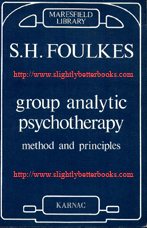
1991, 2nd Printing, Maresfield Library
In stock, click to buy for £18.99, not including post and packing
Alternative online retailers to try:
Click here to access our prebuilt search for this title on Abebooks
Or click here to access our prebuilt search for this title on Alibris
Or click here to access our prebuilt search for this title on Ebay
Or try Biblio



|
About this book: About this book: Group analysis is a form of psychotherapy in small groups and also a method for studying groups and the behaviour of human individuals in their social aspects. Apart from a number of practical advantages, it has features of specific value. It is the method of choice for the investigation of many problems and for the treatment of many disturbances. This volume puts the method into the centre, emphasises the special features of the "group analytic situation" and the role of the conductor, or leader, in creating this situation. It tries to show what the conductor has to do in order to make all the members of his group active participants in the solution of their problems. In so doing, it shows how not only the group itself, but also how every single individual can best develop his own personality. Although the group is the field of operation, it is the optimal degree of liberation and integration of the individual which is the ultimate aim of this therapy
Chapters:
Acknowledgements
Introduction by Max Rosenbaum
SECTION 1 GROUP-ANALYTIC ORIENTATION
1. What is group-analytic Psychotherapy?
General principles; different types of group in operation; large groups; Northfield Therapeutic Community
2. The Life Group
Network; plexus; Family treatment and diagnosis; Marital Couples
SECTION II. THE GROUP-ANALYTIC GROUP
3. Diagnostics
Questionnaires, tests; Pictorial Profiles; Initial interviews (a) individual (b) group; A psychodiagnostic experiment
4. Therapeutics
Indication, counterindication; selection for different forms of group-analytic groups; Total duration; termination; drop-outs; absences and holidays; fees
5. The Group-Analytic Situation
Conditions set; principles of conduct required; administration
SECTION III THE CONDUCTOR
6. The Conductor in Action
PART I. As Administrator
Notations; Attendance Sheet; Position Chart; Auxiliary Devices; Co-Conductors; Keeping Notes
PART II. As Group Analyst
Analytic attitude and general orientation; the therapeutic processes in the group; transpersonal processes in the group matrix; interpretations on the part of patients, conscious and unconscious; The conductor's interventions on the grounds of location and resonance; boundary incidents; interpretations; different types; transference interpretations; analysing; transference analysis in action
PART III. Observations and Maxims
Example of boundary incident; interactions across the boundary; interpretation to group-as-a-whole; unexpected effect of a statement by conductor; transference interpretations, correct, yet defensive; Co-conductor's report; The beginning of a group; Maxims
7. The Conductor as a Person and his Training
Personal Qualities; Pros and cons of medical, psychiatric and psychoanalytical training; general education; optimal and minimal requirements
8. On Teaching Psychotherapy
Teaching and Psychotherapy; resistances; supervisory group
References. Index |
Other titles on group counselling:
|
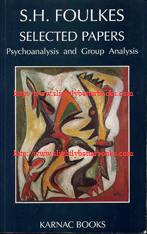
1990, Karnac Books, pbk
In stock, click to buy for £25.99, not including postage and packing
Alternative online retailers to try:
Click here to access our prebuilt search for this title on Abebooks
Or click here to access our prebuilt search for this title on Alibris
Or click here to access our prebuilt search for this title on Ebay
Or try Biblio



|
About this book: Born in Karlsruhe in 1898, S. H. Foulkes studied medicine in Heidelberg and Munich after the First World War, eventually qualifying in Frankfurt in 1923. During the course of his studies, his growing interest in psychology brought him into contact with the writings of Sigmund Freud, and the desire to become a psychoanalyst led him, in 1928, to Vienna where he secured a training analysis under Helene Deutsche. At the same time, he undertook psychiatric training at the University Clinic. By 1930, he had joined the Frankfurt Psychoanalytic Institute and commenced working in private practice. As it became clearer, however, that the rise of Hitler would prove the death-knell for psychoanalysis in Germany, Foukes and his family suddenly left the country for Geneva in April 1933, and shortly thereafter, at the invitation of Ernest Jones, settled in London. The outbreak of the Second World War, and a temporary removal to Exeter, led him into a deeper involvement with the concept and practice of Group Analysis and Group-Analytic Psychotherapy, the fields for which he is best known. In 1952, with others, he founded the Group-Analytic Society, and was still actively involved with teaching, lecturing and participation in group seminars when he died in July 1976. This collection of Foulkes' papers, which includes some unpublished material and some published in English for the first time, comprises not only the later Group-Analytic writings but also those from the first part of his career as a psychoanalyst. Amongst the latter, the paper 'On Introjection' is of particular interest and importance
Contents:
Acknowledgements
Preface by Elizabeth Foulkes
Foreword by Malcolm Pines
PART ONE
Biographical
1. S.H. Foulkes: a brief memoir by Elizabeth Foulkes
2. 'Recollections of my visit to Freud' (1969)
PART TWO
Psychoanalytic Papers
3. Observations on the significance of the name in a schizophrenic (1930)
4. Biology in the light of the work of Kurt Goldstein (1936)
5. On introjection (1937)
6. Book review of Norbert Elias' 'The Civilising Process' (1938)
(1938)
7. On a chapter of Helen Keller's 'The World I Live In' (1941)
8. On not knowing the analyst (1942)
9. The idea of a change of sex in women (1953)
10. Psychoanalytic concepts and object relations theory: comments on a paper by Fairbairn (1957)
11. Psychoanalysis and crime (1944)
PART THREE
Group-analytic papers
12. On group analysis (1946)
13. Discussion of L.S. Kubie's paper, 'Some theoretical concepts underlying the relationship between individual and group psycotherapies' (1958)
14. The position of group analysis today, with special reference to the role of the Group-Analytic Society (London) (1961)
15. Some basic concepts in group psycotherapy (1966)
16. A Soviet view of group therapy: discussion of a paper by N.V. Ivanov (1966)
17. On group-analytic psycotherapy (1968)
18. Group dynamic processes and group analysis (1968)
19. On interpretation in group analysis (1968)
20. Two opposed view of social psychiatry: the issue (1969)
21. Access to unconscious processes in the group-analytic group (1971)
22. The group as matrix of the individual's mental life (1971)
23. Oedipus conflict and regression (1972)
24. Problems of the large group (1975)
25. My philosophy in psychotherapy (1974)
26. Concerning criticism of inner-object theory (1975)
27. The leader in the group (1975)
28. Notes on the concept of resonance (1977)
References; Index |
Books on Group Psychoanalysis
|
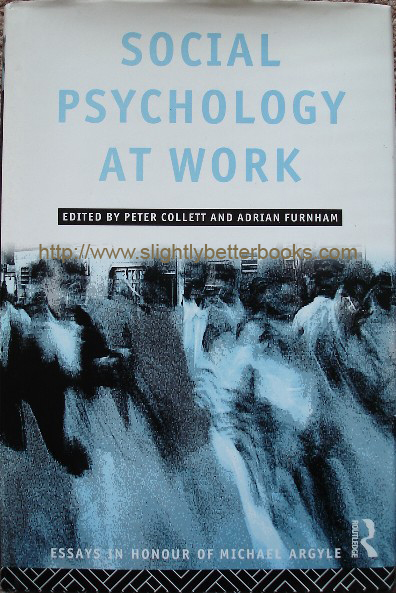
1995, Routledge, hbk
In stock, click to buy for £49.99, not including p&p
Alternative online retailers to try:
Click here to access our prebuilt search for this title on Abebooks
Click here to access our prebuilt search for this title on Ebay
Click here for our prebuilt search for any edition of this book on Alibris
Or try Biblio
|
About the Book/Synopsis: In this book, leading psychological researchers discuss their recent work (recent to 1995, the date of publication) and findings and what implications it has for real world problems, particularly those in industrial and organizational settings from offices to factories.
The book is dedicated to Michael Argyle, one of the best known and leading English Social Psychologist of the 20th Century, who was well known for preferring to use experimental methods to further the science of Social Psychology. The book was commissioned to mark his retirement at the end of 1992. Michael Argyle died 7 years after publication on September 6, 2002, at the age of 77.
Contents:
List of Figures and Tables
List of Contributors
Editorial Introduction
1. Socialization for work by Nicholas Emler
2. Personality at work by Adrian Furnham
3. Personality and Productivity by Mark Cook
4. Organizational leadership and followership: the role of interpersonal relations by Edwin P. Hollander
5. British Businessmen Abroad by Peter Collett
6. Pay satisfaction in America and Britain by Colin Fraser and Leonard Berkowitz
7. Work and well-being among offshore oil employees by Katharine R. Parkes
8. Job demands and anxiety by Donald Broadbent
9. Socializing Work by David D. Clarke
10. How environmental variables influence behaviour at work by Robert A. Baron
11. Social skills and work by Peter Trower and Henk T. van der Molen
12. Putting Practice Into Psychology by David Pendleton
13. Age and work by Peter Warr
14. Social Psychology of work: towards 2000 by Peter Robinson |
Michael Argyle Books on Amazon:
|
|
|
[top] |
| |
Books on Amazon:
[please note that lack of pricing for a book does not mean book is out of stock, but that there are only secondhand copies available]
|
[top] |

